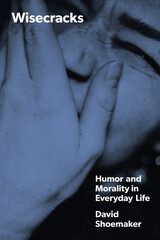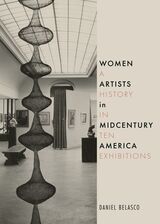21 have author last names that start with S have author last names that start with S
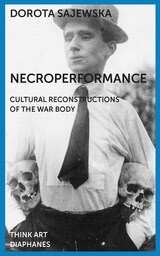
Searching for traces of memory in precarious bodies inflicted with the violence of war, Necroperformance implores us to acknowledge the fragility of life as it actively reinforces an attitude of respect for the right to live. Sajewska constructs here an alternative culture archive, conjuring it from compoundly-mediatized historical remnants—bodies, documents, artworks, and cultural writings—that demand to be recognized in non-canonical reflection on our past. Her chief objective is to understand the social impact of remains and their place in culture, and by examining the body and corporality in artistic practices, social and cultural performances, she strives to identify both the fragmentariness of memory and the discontinuity of history, and finally, to reinstate the body’s (or its documental remains’) historical and political dimension.
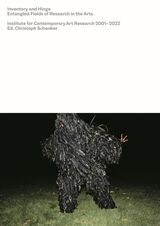
Artistic work connects multiple competencies, areas of knowledge, and ways of life. The Institute for Contemporary Art Research (IFCAR) has made this principle its guiding ethos through organizing research projects in correspondence with this transgressive gesture, manifesting as interdisciplinary, networked knowledge production.
Inventory and Hinge offers an overview of the research projects performed over the last two decades at IFCAR through project descriptions, plentiful illustrations, and, most importantly, links and QR codes that grant access to nearly all publications and websites that were created by the individual projects he discusses.
Although art as research has a long tradition outside of institutions, Inventory and Hinge chronicles IFCAR’s drive to introduce this new discipline and establish a new artistic genre.

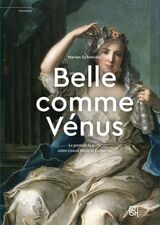
Ces portraits dits « historiés », dans lesquels l’effigie d’une personne vivante s’enrichit d’attributs mythologiques comme dans un tableau d’histoire, sont un genre pictural à part entière. D’abord prérogative masculine adoptée par les grands pour célébrer leurs vertus, il devient vers 1680 l’apanage des modèles féminins : le langage allégorique les pare de qualités à connotation spécifiquement féminine et galante, comme la beauté, la jeunesse, la grâce, qui, bien comprises, pouvaient aussi être un moyen de manier le pouvoir. Dès les années 1740, ces peintures font cependant l’objet de critiques répétées et le genre perd peu à peu sa légitimité à la fin de l’Ancien Régime, avant que ce procédé de distinction aristocratique suscite la méfiance des historiens de l’art, qui n’y verront que l’expression d’un amusement futile de milieux oisifs.
Le présent ouvrage remet à leur juste place ces travestissements : à la fois œuvre d’art, objet culturel et pratique sociale, le portrait historié est un phénomène de goût révélateur d’une culture de cour en pleine transformation. Marlen Schneider met ici en lumière les fonctions, les propriétés formelles, la réception et la portée historique d’un type de représentation trop longtemps déconsidéré.
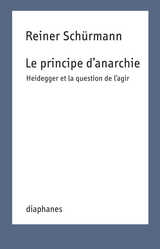
Interprétation audacieuse et vivifiante de l’une des oeuvres philosophiques les plus marquantes du XXᵉ siècle, Le principe d’anarchie a influencé de nombreux philosophes français contemporains. Trente ans après la première publication, la présente réédition témoigne que cette oeuvre longtemps épuisée n’a rien perdu de son actualité ni de sa force.
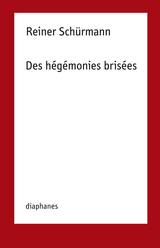
Il s’agira donc de retracer une histoire de soumissions par nous-mêmes encourues.

The Place of the Symbolic gathers Reiner Schürmann’s essays on the nexus of art and politics. In keeping with his translation of the destruction of metaphysics into an an-archic philosophy of practice, Schürmann develops a radical theory of the place of symbols, irreducible either to idealist theories of symbols or structuralist accounts of the symbolic. Symbols, Schürmann argues, may provide a bridge between ontological difference and politics. They resist being grasped metaphysically, in terms of representation. Instead, their understanding requires a specific way of existence: attending to the coming-to-presence of phenomena. As such, the understanding of symbols discloses a form of praxis that abandons ultimate grounds and opens onto the manifold.
Alongside Schürmann’s theory of symbols, the collection includes essays on the relation between metaphysics, tragedy, and technology; on the “there is” in poetry; as well as on judgment. Throughout these characteristically lucid interventions, Schürmann’s most urgent concern remains a consideration of singular and finite practices that enact a release from universal principles. Art and politics appear here as the unworking of ultimate grounds; that is, as practices attuned to a truly groundless form of life.
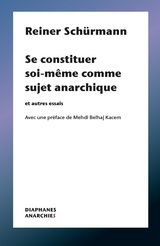
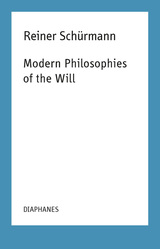

“The destruction has no other intent than to win back the original experience of metaphysics through a deconstruction of those conceptions which have become current and empty.” The purpose of taking to pieces the fabric of Western metaphysics is to show how at each important stage “the question of the meaning of Being has not only remained unattended to or inadequately raised, but that it has become quite forgotten in spite of all our interest in 'metaphysics'.”
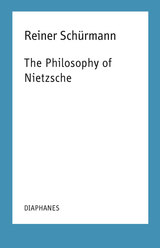
This volume of Reiner Schürmann’s lectures unpacks Nietzsche’s ambivalence towards Kant, in particular positioning Nietzsche’s claim to have brought an end to German idealism against the backdrop of the Kantian transcendental-critical tradition. Rather than simply compare the two philosophers, Schürmann’s lectures help us to understand the consequences Nietzsche derived from Kantian concepts, as well as the wider horizon within which Nietzsche’s ideas arose and can best be shown to apply. According to Schürmann’s trenchant reading: if Nietzsche was indeed “fatal” to Western philosophy, as he claimed, he was so in large part because of the Kantian transcendental thinking from which he inherited the very elements and tools of his criticism.
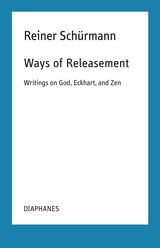
In 1962, Reiner Schürmann began studying at the Dominican school of theology Le Saulchoir, outside Paris. That experience radically shaped his life and work, enabling him to begin to develop many of the ideas for which he would later be known: letting be, life without why, ontological anarchy, and the tragic double bind.
Ways of Releasement contains never-before-published material from Schürmann’s early period as well as a report Schürmann wrote about his encounter with Heidegger; a précis of his autobiographical novel, Origins; and translations and new editions of later groundbreaking essays. Ways of Releasement concludes with an extensive afterword setting Schürmann’s writings in the context of his thinking and life.

This volume in a planned twenty-nine-part series, Reiner Schuermann: Luther. The Origin of Modern Self-Consciousness sees Schuermann tracing Luther’s conception of the rise of self-consciousness as the subjective reference point. Schuermann then explores this conception in conversation with both the Cartesian cogito and Kantian apperception.

Le titre est, bien entendu, inspiré par Althusser (“Lire Le Capital”) – mais de façon polémique. Par “lire Marx” j'entends lire Marx et non pas Engels, Mao, Gramsci, Lukács, Marcuse, Althusser et ainsi de suite. En d'autres termes : le but de ce cours est, avant tout, de délibérément désintriquer la pensée de Marx de la pensée marxiste. Une polémique avec certains marxistes sera ainsi menée en sous-main, par des allusions ponctuelles. Un tel programme véhicule trois implications majeures : Qu'il y a effectivement une différence de pensée entre Marx et le marxisme. Ce premier point sera établi à travers une lecture philosophique de Marx : l'hypothèse étant que ce qui se trouve de plus original dans Marx, ce n'est ni sa pensée politique, ni sa pensée sociologique ou économique, mais bien sa charpente philosophique. Cette charpente philosophique détermine et situe ses autres théories. La seconde implication, c'est qu'un clivage entre Marx et les marxistes existe comme tel, qu'il peut être défini par certaines caractéristiques générales, et que ces caractéristiques générales différent de la pensée originale de Marx ou la restreignent. Il s'agit là d'un sujet passablement complexe, voire compliqué ; mais on peut résumer ce clivage en disant que le marxisme
a surtout retenu de Marx les éléments utiles à l'action politique dans une situation donnée, urgente. Une théorie de la “praxis révolutionnaire” a donc pris la place de la philosophie. La troisième implication est la précompréhension qui préside à l'approche du texte. Un texte est quelque chose d'imprimé : il représente comme tel un objet clos, constitué, fini. Mais nous n'en obtiendrons de réponses décisives que si nous le soumettons à des questions décisives. Et la question décisive que soulèvent les marxistes, c'est l'urgence d'une situation révolutionnaire (qu'elle existe de fait ou doive être réalisée). Leur question est donc généralement homothétique à celle de Lénine : “Que faire ?” C'est la question de ceux qu'Althusser appelle les “intellectuels militants” (pour Marx 24), et qui participent directement aux luttes de la classe ouvrière. Une telle “ lecture” de Marx est stratégique. Or, je tiens que la lecture stratégique ne peut que rester aveugle, de par sa nature même, au questionnement philosophique. Notre précompréhension des textes de Marx n'a, par conséquent, rien de stratégique ; elle est bien plutôt qu'ils proposent une réponse à la plus ancienne question de la philosophie occidentale : ti to on, savoir : qu'est-ce que l'être ? ou : qu'est-ce que la réalité, ainsi que son corollaire : qu'est-ce que la vérité ? Donc : Marx versus marxisme ; le concept de “praxis” comme étant le concept différenciant Marx du marxisme ; une double théorie des textes. Développons plus avant ces trois points

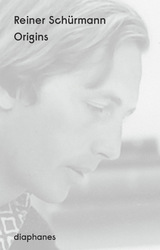
Originally published in French in 1976, Origins was the winner of the coveted Prix Broquette-Gonin of the Académie Francaise. In close collaboration with the author, this meticulously crafted translation was created in the early 1990s, but Schürmann’s premature death in 1993 prevented its publication process and, as a result, one of the most important literary accounts of the conflicted process of coming to terms with the Holocaust and Germany’s Nazi past has been unavailable to English readers until now. Candid and frank, filled with fury and caustic sarcasm, Origins offers insight into a generation caught between disappointment and rage, alignment and rebellion, guilt and obsession with the past.
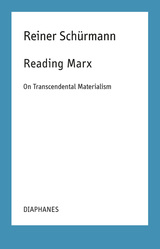
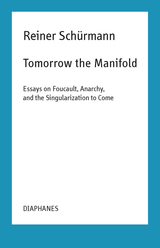
Taken together, these pivotal essays introduce the reader to Schürmann’s most urgent concerns and assemble the conceptual tools that go on to lay the groundwork for his final work, Broken Hegemonies, which offers a subversive re-reading of the history of Western metaphysics outside of Foucault’s genealogical approach. To the reader unfamiliar with Schürmann’s work, these texts establish him as one of the most radical thinkers of the late 20th century, whose work might eventually become legible in our present.
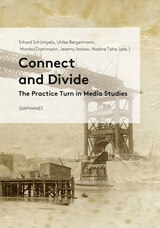
This new anthology takes stock of our empirical and historical understanding of the two-sided nature of media and tracks the recent turn in media studies to examining practice itself. A unique discussion of the intersection of media theory and practice theory, Connect and Divide explores how distributions of knowledge, labor, and power may be hidden in what remains untraceable about media, shedding vital light on the social implications of media theory today.
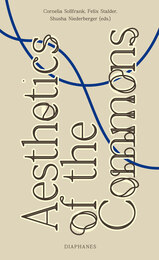
Aesthetics of the Commons examines a series of artistic and cultural projects—drawn from what can loosely be called the (post)digital—that take up this challenge in different ways. What unites them, however, is that they all have a double character. They are art in the sense that they place themselves in relation to (Western) cultural and art systems, developing discursive and aesthetic positions, but, at the same time, they are operational in that they create recursive environments and freely available resources whose uses exceed these systems. The first aspect raises questions about the kind of aesthetics that are being embodied, the second creates a relation to the larger concept of the commons. In Aesthetics of the Commons, the commons are understood not as a fixed set of principles that need to be adhered to in order to fit a definition, but instead as a thinking tool—in other words, the book’s interest lies in what can be made visible by applying the framework of the commons as a heuristic device.
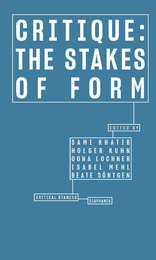
READERS
Browse our collection.
PUBLISHERS
See BiblioVault's publisher services.
STUDENT SERVICES
Files for college accessibility offices.
UChicago Accessibility Resources
home | accessibility | search | about | contact us
BiblioVault ® 2001 - 2024
The University of Chicago Press




